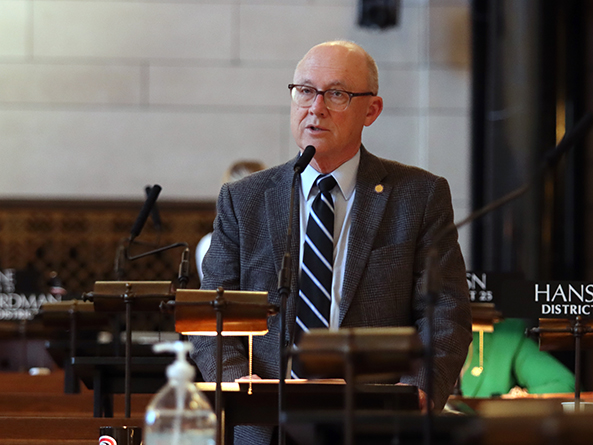Special committee on legislative oversight approved
Lawmakers voted Feb. 23 to authorize a special committee to review the Legislature’s oversight functions.

LR298, introduced by Speaker John Arch of La Vista, creates the Legislative Oversight Review Special Committee of the Legislature. As introduced, members would include the speaker, chairpersons of the Executive Board, Judiciary and Health and Human Services committees, two at-large members of the Executive Board and three at-large members of the Legislature.
An amendment from the Executive Board, adopted 37-1, added all voting and nonvoting members of the Executive Board to the special committee membership.
Arch said the committee will allow the Legislature to engage in a long-term examination of its “complicated and multifaceted” oversight functions during the next interim and determine any changes that need to be made.
The status of three facets of that oversight — the Office of Public Counsel and the offices of Inspector General of Nebraska Child Welfare and Inspector General of the Nebraska Correctional System — have been in question since the attorney general issued an opinion in August of last year that cast doubt on the constitutionality of those offices.
Following that opinion, the executive branch removed access to facilities and databases needed by the offices to carry out their work. A memorandum of understanding signed by representatives of the legislative and executive branches earlier this month will restore access needed to carry out those oversight functions while the special committee does its work, Arch said.
The committee will study the structure and organization of current legislative oversight functions that exist within legislative divisions and offices. It also may study oversight conducted by statutorily created boards and commissions in Nebraska and the legislative oversight functions of other state legislatures.
In addition to holding hearings, the committee could, with authorization from the Executive Board, issue subpoenas. It will issue a report and any recommendations to the Legislature no later than Dec. 15, 2024, and terminate Dec. 31, 2024.
Sen. John Fredrickson of Omaha said he appreciated the attempt to move forward and allow the IGs to continue their important work, but he raised concerns about what he described as the erosion of legislative power that necessitated the resolution.
“We should have grave concern when we have branches [of government] — and, specifically, some code agencies — who are deciding to not follow the law,” he said. “Because once that starts happening and becomes normalized, that strips all our power as a legislative body.”
Omaha Sen. Machaela Cavanaugh echoed those concerns. A comprehensive review of legislative oversight is “long overdue,” she said, but she expressed concern that the path laid out in LR298 and the MOU gives the impression that the executive branch can break the law and face no consequences for doing so.
Omaha Sen. Terrell McKinney agreed. He said the Legislature has constitutional authority over the state’s correctional system and should not have allowed the state Department of Correctional Services to deny the IG’s office access for more than six months.
“We’re willing to give up that authority to the executive branch because, I guess, they can do what they want,” McKinney said.
Sen. Mike Jacobson of North Platte supported the resolution, calling it a “practical” approach to a difficult situation. The Legislature could have tried to resolve the IG’s lack of access through the courts, he said, but the agreement reached through LR298 and the MOU allows for a more definitive and comprehensive response to the situation.
“You can always sue, but you never quite know what the answer is going to be,” Jacobson said.
Following adoption of the committee amendment, lawmakers approved LR298 on a 38-1 vote.


